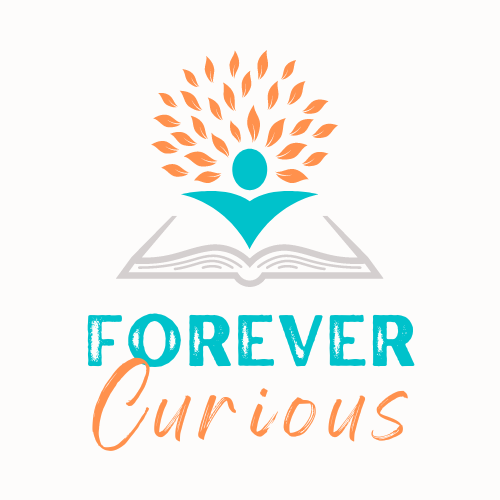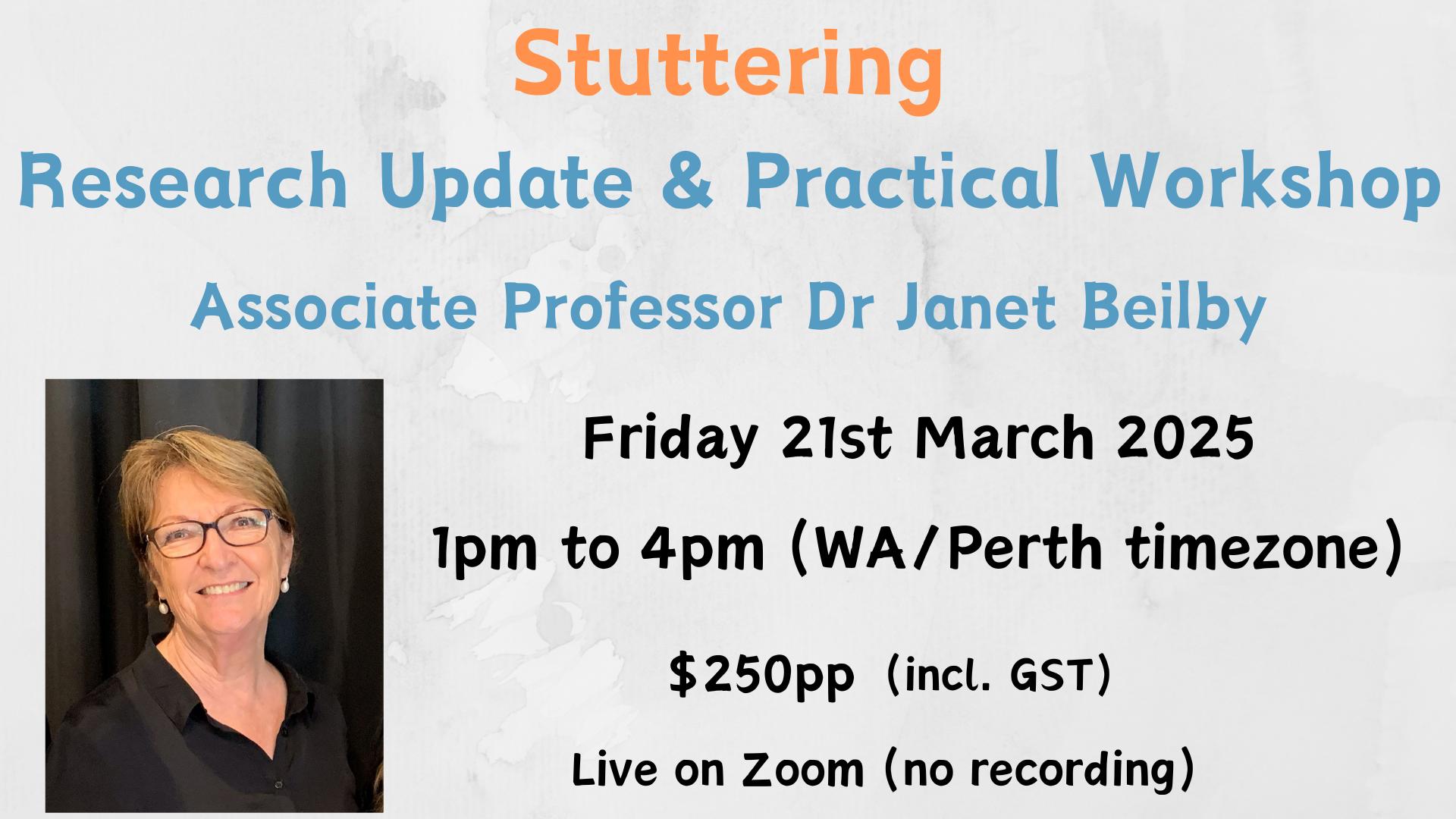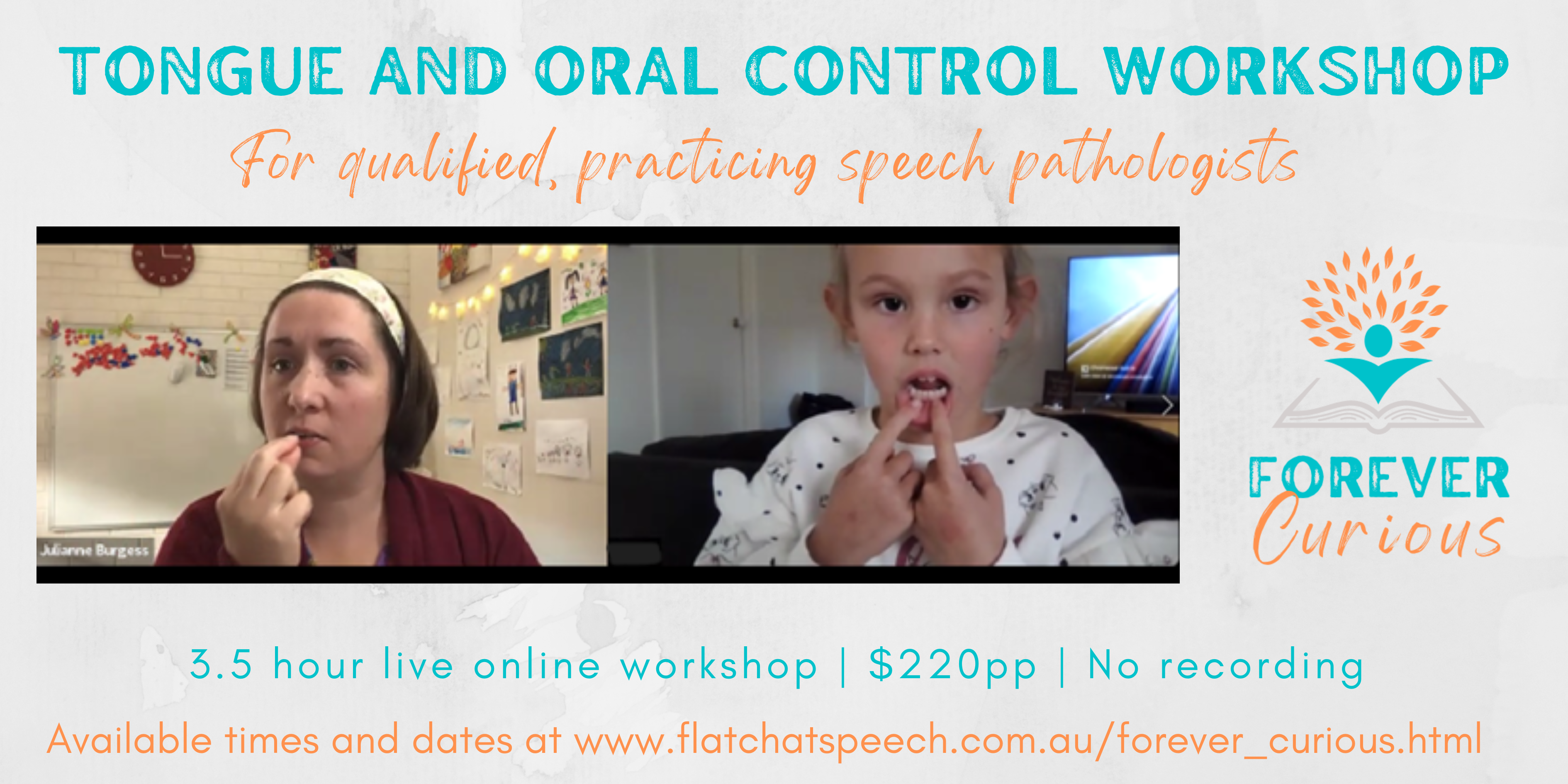
0409 083 454
info@flatchatspeech.com.au | Julianne is a little bit addicted to learning and is always seeking to understand something new.
Forever Curious is the business name she uses when running professional learning sessions. |

Workshop overview
Whether a child does or does not develop stuttering results from an interaction of genetics, environment and temperament. Epigenetic research and phenotyping of people who stutter has enabled a deeper understanding of how these factors affect the presentation and persistence of their stuttering symptoms.
Neurobiological research including fMRI has enabled the identification of loci of stuttering, and investigated the brain’s response to stuttering interventions.
Much of what constitutes “stuttering” cannot be observed by the listener, and includes sound or word fears, situational fears and anticipation. These factors, while not necessarily observable, have to be considered and addressed in a complete therapy program. In other words, a simple reduction in stuttering is typically inadequate for the person to be an effective communicator. Speech pathologists need to consider fluency across a range of contexts, rather than rely on fluency that is established in the clinical setting.
There is a strong need for individualized therapy programs rather than a ‘one size fits all’ approach to treatment.
This workshop will run for 3 hours and contain two parts. The first hour will provide an overview of the current research and outline how this affects clinical decision making. Following this essential foundation, the next two hours will be dedicated to practical application and examples of this research at work in real life clinical presentations.
This workshop will include content relevant to young children, school-aged children, teenagers and adults who stutter.
Participants are invited to submit videos of their clients for viewing and discussion during the practical section. Videos must be submitted ahead of time with appropriate permissions (instructions provided on registration).
Recording of this PD is not permitted due to client confidentiality.
Dr. Janet Beilby
Associate Professor Dr. Janet Beilby has been a lecturer, researcher and clinician in the field of stuttering for 40 years. She is a leading speech pathologist and geneticist, recognized for her pioneering research in the integration of genetics, early intervention, and stuttering therapy. Dr. Beilby’s research focuses on the role that integrated theoretical knowledge can play in early intervention strategies, especially in young children. She has developed therapeutic models that combine genetic insights, behavioural therapy, and speech pathology techniques to provide more tailored and effective interventions for children at risk of or showing early signs of stuttering.
A strong advocate for early intervention, Dr. Beilby has demonstrated through her research how a personalised, individual approach addressing the different stuttering typographies, behavioural and therapeutic considerations —incorporating a new model of stuttering—can improve outcomes for children who stutter and their families. Dr. Beilby creates treatment protocols that are both evidence-based and adaptable to the unique needs of each child and their family. She has treated thousands of clients, trained hundreds of students and been awarded many grants to investigate stuttering disorders, dementia and virtual education.
Dr. Beilby and her clinical research team pioneered the Curtin University Stuttering Program (CUSP) which has proven successful in the treatment of thousands of individuals who stutter from across Australia and internationally, often helping those who have not received successful therapy elsewhere. Dr. Beilby’s CUSP treatment was recognized for exceptional quality service by the Curtin University Vice-Chancellor and Dr. Beilby’s clinical excellence and advocacy was highlighted when she received the International Fluency Association's Clinician Excellence Award.
Dr. Beilby is a board member on the World Stuttering and Cluttering Organisation’s Standards of Practice committee, is a long-standing Advisory Board member for the SpeakEasy Association of Australia, and is a Fellow of Speech Pathology Australia. Dr. Beilby is part of an international consortium which has identified the genes responsible for stuttering disorders and is now co-investigator on a stuttering genetic grant worth over $10 million (AUD). Speech Pathology Australia recently honoured Dr. Beilby for her 40 years of valued contribution to speech pathology.
Dr. Beilby is pleased to present her new clinical research pertaining to successful, integrated treatments for early stuttering disorders.

Julianne has been a speechie for 20 years. About 9 years ago she started a quest to discover how she could help clients who couldn't generalise progress with lisp and lateral speech sounds. This included a 28 hour orofacial myology course completed twice - in 2020 and in 2023.
Julianne now routinely treats the tongue thrust and resting tongue position underlying lisp and lateral speech sounds, via chewing and swallowing skills. She is a firm believer in ‘tricking’ a child’s system into achieving the desired skill with the minimum amount of instruction, making one small change at a time.
What this PD is: A deep dive into tongue movement, oral muscle use, chewing, swallowing and speech sounds with a strong focus on what to look for (with lots of video) and what questions to ask your clients. The focus is clinical decision making.
What this PD is not: A replacement for the 4 day oro-facial myology training, nor a prescriptive ‘do it my way’ program, nor an analysis of the current research.
Who this PD is for: Qualified practicing speech pathologists.
This PD uses a significant amount of client video with permission, and therefore cannot be recorded by Julianne or the participants.
Session Times
This course has run many times in the last few years, and is now scheduled by request.
If you are interested in completing this course and there are no dates listed below, please send us a message.
NB: Please double check the time in your timezone. All Perth times are correct.
All care has been taken while converting to other times, but mistakes are always possible.
| Date | Time | Booking link |
| Friday 23rd May 2025
|
AWST (WA): 9:30am to 1:00pm
AEST: 11:30am to 3:00pm
| Booking and information by Perth Hills Allied Health |
UA-74036222-1